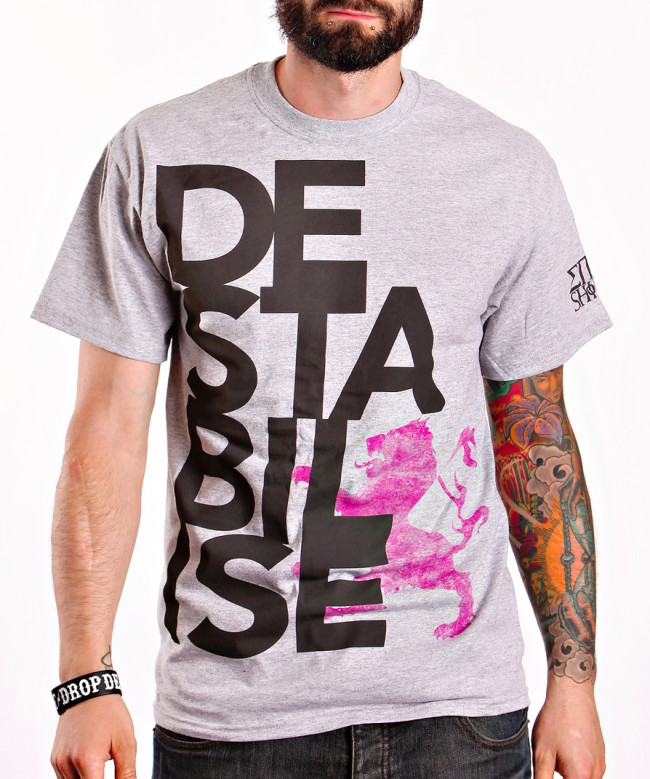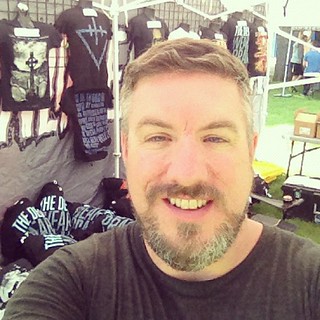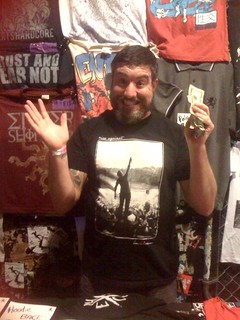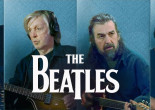Talking bands, business, venues, and life on the road with the merch guy

Full disclosure, Bob Russamano and I go back a ways.
I first met Bob in 1994, when we were both incoming freshmen at King’s College. The Lehigh Valley native/current Philadelphia resident and I shared a deep love of music – something we’re still both pursuing today. As a couple of Mass Communications majors, we had some great times at King’s, from programming our own shows and participating in public service broadcasts at the college radio station, 88.5 WRKC, to actually collaborating on a senior project for the Mass Comm department, where we created a multimedia advertising campaign for WRKC.
I still have that VHS we produced – it was fun to make and also looks that way. Let’s just say video editing technology was not as user-friendly in those days…
Currently, as I write freelance and work by day in local television, Bob lives a life I’ve followed over the years with great admiration – he’s active in tour merchandising, having the opportunity to travel both nationally and internationally with bands like Enter Shikari, as well as successful tours like the annual Vans Warped Tour. Drawing from his 15 years of experience in the increasingly important area of merchandising, I posed some pertinent questions to Bob recently that should familiarize the novices with what goes into the business of tour merch, as well as answer some of the basic questions about the day-to-day operations of a touring act’s merch operation.
Bob has currently cut down on his time on the road a bit, devoting time to a steadier gig at Philly’s Union Transfer. That hasn’t stopped him from sending some fantastic backstage/candid pictures from his adventures lately on short road runs to places like New York City’s Radio City and Tennessee’s Bonnaroo – proof that merch is more ingrained than ever into the business of touring, as he explains.
Here’s some interesting stuff from a guy that’s seen the belly of the beast and continues to thrive within it.
NEPA SCENE: Tell us about how you began in tour merchandising.
 |
BOB RUSSAMANO: In 2000, I started working at a record label called Vagrant Records. I was the shipping/warehouse manager. In 2003, they asked if I wanted to go on the Vans Warped Tour repping the label – and of course I jumped at the chance. On that tour, I did my first (and what could’ve been my last) merch gig for Face to Face. I went to do seven more Warped Tours and two Mayhems after that. My first real merch gig was with some co-workers of mine who had a band called The Bronx. I was their first merch guy, and from them, I caught the touring bug. After I left Vagrant, I decided that I wanted to tour for a living, and selling merch was the gig I was the best at.
NS: What were your initial impressions of this sector of the music business? Is it difficult to adapt to and work in?
BR: I’ve always been interested in tour merchandise, especially t-shirts. Whenever I went to shows in college, I would always hang around the merch table. The hardest part is maybe the fact that most people don’t see it as a real job when, in fact, it is a hard job that is also very important for the touring artist. Merch people are in charge of thousands of dollars’ worth of merchandise inventory and handle lots of money daily. That gets taken for granted by the general public.
NS: There are many misconceptions from fans about merch. One example you always hear at a show is that the bands may intentionally charge higher prices at live gigs than, say, what’s available on their website. Many people don’t realize that this is due to venues getting a cut of the profit. How does that whole arrangement work? Are Live Nation venues different than a small independent theater?
BR: Venue percentages are determined ahead of time by the booking agent and venues and are usually written into the contract for the shows. Sometimes the venues take it seriously and do full counts of your merch, and sometimes they leave it up to the honor system.
Most Live Nation venues are very strict about merch percentages and will take as much as they can, but that’s part of dealing with a corporation. It’s not a fun part of the job, especially when you work for a band who depends on merch money to get them from show to show. Unfortunately, it’s part of the job, and there’s really not much you can do about it. Many feel that if a venue can take percentage of merch sales, then the band should get a percentage of bar sales, but you know that will never happen.
NS: You’ve been a part of some big tours, including Warped and Enter Shikari. What’s the best touring experience you’ve had and why?
BR: The best touring experience for me was touring Europe/U.K. with Enter Shikari twice. I had never been overseas, and to do it that way the first time was amazing.
NS: What’s the worst experience you’ve had on the road?
BR: The worst experience, there are too many to count – from bad weather to annoying patrons. Working Governors Ball in NYC three years ago in mud past your ankles was pretty miserable. The bad gigs just make you appreciate the good gigs even more.
NS: Walk us through a typical day on a tour. What’s the first thing you do until the last thing before you leave a venue?
BR: A typical day for me is wake up (usually in a bunk on a tour bus), find a clean bathroom and some coffee, and then find out where the merch area is. I gather the merch I need for the day (usually in a trailer). I count in all of my merch and keep track of it on an Excel spreadsheet or at the venue depending on what merch company I’m working for. Usually a couple hours before doors, the venue will either count in my merch or take my numbers. Then, I set up my display and get my merch ready to sell – then you sit around and wait till doors.
You then sell throughout the show, count out, settle with the venue, and pack everything back in the trailer. Then, I count the money and settle my spreadsheet for the show to make sure the numbers are right – then do it all over again the next day. In between, that is a lot of downtime since you usually arrive at the venue early in the day.
NS: There are probably many unexpected variables from venue to venue. What are some of the things that you may have to watch out for when you encounter an unknown venue?
BR: This is very true; all venues are different. Some provide a specific area for merchandise and have tables set up for you. Some you have to improvise and make do with what they provide. I’ve worked in venues where you’re selling pretty much out of a closet. If you are a headliner, you get the prime spots usually, but if you are an opener, you have to fight for a good spot. Sometimes, you have to fight to get your way because you need to do a job and the venue isn’t much of a help. I’ve been doing it long enough as to where I pretty much know where everything is in a venue and don’t need much outside assistance.
 NS: Who is your main contact or individual you’d answer to on tour? The road manager? Also, how is the merch money handled during a tour since there are large sums of cash to carry on you after selling at a show?
NS: Who is your main contact or individual you’d answer to on tour? The road manager? Also, how is the merch money handled during a tour since there are large sums of cash to carry on you after selling at a show?
BR: Usually, I’m my own boss on tour. I’m employed by a merch company to work for a specific band. I rely on the tour manager for bus call times, buy outs, and maybe hotel info and travel info. We are responsible for all of the money made selling merch, so we must have a safe place to keep it. Keep good track of expenses and do bank deposits regularly if possible. Sometimes when working with bigger bands, the venue will sell for you and then send a check to the merch company. You just need to make sure the numbers are correct.
NS: As far as profits from merch, you’ve probably seen the levels of income from small indie acts all the way up to major label bands. How drastic are the percentages that merch companies would take from a bigger band, as opposed to how much an indie band would be able to keep on a grassroots level? Are your privy to the details of the merch deals artists have?
BR: Lots of bands do deals where they receive a large check up front from the merch company, so the merch company pretty much owns the rights to the merch and the band doesn’t make any more money from merch sales until the advance is paid back – it’s different for each situation.
For smaller bands, merch sales are crucial for staying on the road. It’s how the bands pay for gas and sometimes how they get money to eat (if their guarantee is small). If a band is traveling on a tour bus, the merch money is sometimes used to pay the driver. That is usually at the approval of the merch company. The reason many bands break up is that they have so much debt they can’t afford to stay on the road. Most merch companies will still print up new merch for bands even though the band may owe them money because they need to band to make some money to pay back debts. If you’re Taylor Swift or One Direction and are selling over a million dollars of merch a show, then those issues don’t apply.
NS: Merch is so very important to a band’s livelihood now since no one is selling records. What is your opinion on that?
BR: It’s probably the most crucial part of touring for a band, in my opinion. It’s severely overlooked that way, but in the end, it’s what generating the most revenue for a band. The booking agent, manager and loaders, and catering salaries are all taken out of the guarantee. Merch sales are crucial if a band wants to make any money.
NS: How difficult is it to obtain a position in merchandising, and what would the first step be for someone who was interested in entering that field?
BR: It’s not really that hard to get into. The best thing to do is get involved locally. Work at a venue or ask a local band if you can sell merch for them. Then it’s all about networking and getting your name out there. Most of all is work hard and take the job seriously. Build a good reputation and you should have plenty of work.
NS: You currently are involved with merch at Philly venues, alongside actual touring. Do you enjoy this mix of local and travel?
BR: Yes. I’ve recently cut my touring down tremendously since I’m trying to start a family, and being away for months at a time is not good for that, so I do a lot of one-off gigs and festivals, which can be pretty lucrative.
On top of doing security at Union Transfer in Philly, I will sell merch for any band who doesn’t have a road guy. I love selling merch, so I jump at the chance to do gigs. I’ve been very lucky to work for some bigger bands lately who don’t tour for long periods, so I can go out for a couple weeks and make some good money, then have my job at home.
Mark is a NEPA-based freelance music journalist and live music junkie, living vicariously through the artists he covers.



